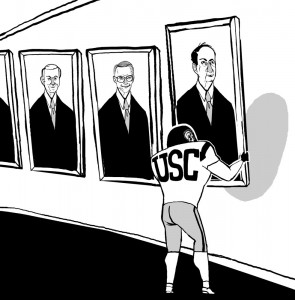A new leader for a new time
While most students were away for the summer, the reins of leadership passed to USC’s 11th president, C.L. Max Nikias. Though the transfer appeared orderly, the circumstances facing Nikias are not.
Former president Steven B. Sample had a remarkable run. His 19 years at the wheel saw numerous academic and athletic accomplishments, sound financial stewardship, exciting campus improvements and a significant rise in the ranks of prestigious universities nationwide.
Yet despite Sample’s brilliance, the worst thing Nikias could do at this moment is stay the Sample course. These are unsettling times, and Nikias has the obligation — and the opportunity — to put his own leadership stamp on the president’s office from the get-go.
As a USC researcher, educator, former dean of Viterbi School of Engineering and USC’s second-ranking officer for the past five years, Nikias has impressive academic firepower. He’ll need it.
Nikias will have to continue the push for the academically enriching environment he sought to cultivate as provost. A call for new scholarship programs that reward students, research funding for innovative initiatives in all majors and continued advancement in the arts and humanities — particularly the Visions and Voices program that he helped found — would continue to attract only top-caliber students to USC.
Next, Nikias must boldly confront the unique obstacles that continue to befall the university’s athletics.
The heavy NCAA sanctions imposed this past summer — notably a two-year postseason football ban and reduced athletic scholarships — extend beyond our student-athletes. The entire university’s public relations, fundraising and even faculty recruitment efforts could be negatively affected unless those in charge turn this heavy blow into an opportunity.
Nikias possesses the necessary enterprise to pull off such a feat. He immediately reshaped the athletic program by naming Pat Haden, a former Trojan quarterback and Rhodes Scholar, the new athletic director. Haden is also a businessman and former USC Trustee who knows the university well and could transform the culture of Heritage Hall.
And by appointing David Roberts, a distinguished attorney, to the newly created position of vice president for athletic compliance, Nikias is showing early signs of decisive leadership and an inclination to boldly move on with the future.
“USC … will seek to excel in the coming years in a manner that is consistent with the highest values of the academy,” Nikias said.
Among our higher values as an academy is our relationship with the broader community, one that cannot diminish. Los Angeles County is currently experiencing a 12.5 percent unemployment rate and a loss of 16,300 jobs in business and professional services alone.
Rebounding from one of the worst economic downturns in history, Nikias must somehow strengthen USC’s bond with the Los Angeles community and with alumni and institutions across the globe.
The fortunes of many businesses and USC partners have gone south. New businesses will eventually rise in their wake — businesses that will be essential to USC philanthropy and academic programs. Nikias will need to hit the pavement building new alliances, being innovative and reaching out to the new cast of post-recession leaders.
Nikias must also take the lead in the renovation of the University Village. As one of the largest construction projects in South Los Angeles — an estimated cost of $900 million — the renovation of the complex gives Nikias an opportunity to promote the project as a source for thousands of jobs and the lively college town that students desire.
This project is part of a larger dilemma: how to leverage USC as a positive force throughout Downtown Los Angeles, an area hit hard by unemployment, vacant rental properties and stagnant investment. It’s a daunting challenge. Nikias must play a key role in helping revive the climate of Downtown. A campus island, however well tended, will increasingly be at a competitive disadvantage compared to other, more social university communities in Los Angeles.
Ultimately, Nikias must be a leader of the future, not of the past.
Among the many Sample fans, some are bound to suggest that if Nikias just continued Sample’s initiatives and mimicked his style, that would be success enough. And granted, our new president could have been left with a far inferior blueprint to follow. But Sample himself would likely urge against tracking in his footsteps.
In his The Contrarian’s Guide to Leadership, Sample wrote: “If we are to raise up great leaders for our own age, we probably don’t want to clone the leaders of the past … [leadership] is highly situational and contingent.”
Especially in this time of drastic change and challenge, our faculty, the student body, Nikias’ administrative colleagues and the Trustees would do well to encourage Nikias to trust his own vision, instincts and creativity and to leave his own mark immediately. Let him never hear the words, “Sample wouldn’t do it that way.”
Stephen Zelezny is a freshman majoring in public relations.

